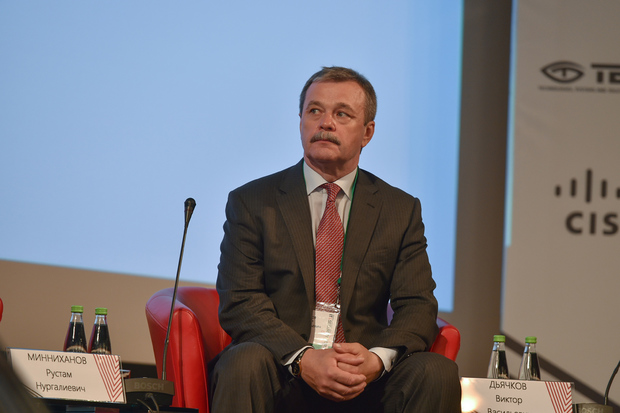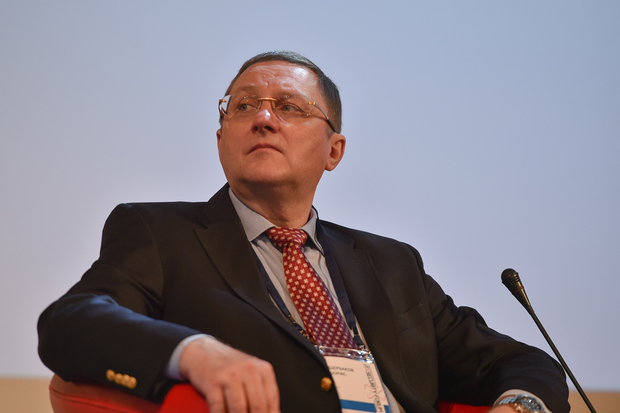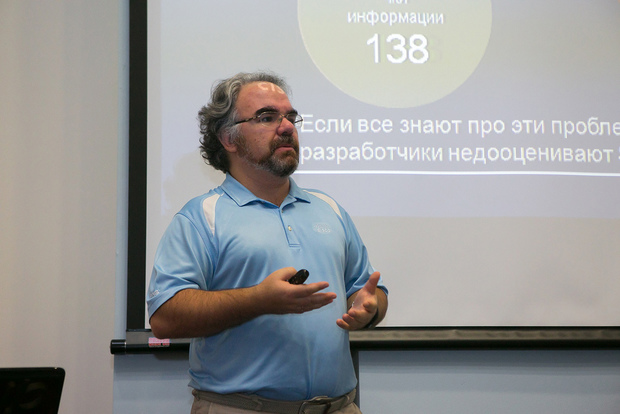Viktor Dyachkov intends to make Kazan the computer capital of Russia
One of the competence centers at NATO is planning to respond to cyberattacks with the bombings
On 26-27 May, Kazan hosted the anniversary (10th) IT & Security Forum. The event was attended by 900 people from 60 cities of Russia and abroad. The opening ceremony was attended by RT President Rustam Minnikhanov. The correspondent of Realnoe Vremya became a witness to how experts discussed cyber security. The emphasis from the security has been shifted to survivability, and NATO is preparing a legal basis for the bombing of hackers.
Russian computer is proposed to be made in Kazan
In the framework of the forum specifically for journalists there was organized a press conference where the Director General of ICL group of companies Viktor Dyachkov announced pretty tempting for Tatarstan prospects of a project.
'There is a project, if it takes place, Kazan will become an exporter of software and hardware solutions, and this will be the figures of sales volumes at $1.2-2 billion a year. Now we are choosing a partner and considering a number of technological niches, which will allow us to do it,' said Dyachkov.
The moderator of the press conference Leonid Tolchinsky, commenting on this statement, noted that it was created an intrigue; however, he did not clarify what he meant. In the course of communication with the head of ICL the correspondent of Realnoe Vremya enquired whether it was possible to lift the veil of secrecy over such a promising start.

'It is not a project yet. The government has announced that it wants to have an opportunity to get technical solutions on the basis of domestic cpu. The declared platform Elbrus — it uses the architecture based in Soviet times, this technology was further developed. And now we want to occupy the same niche as the Kazan plant of computers occupied. We are ready to produce systems, to produce all necessary equipment and be responsible for all problems that a user may have,' told Dyachkov to Realnoe Vremya.
However, he added that this is all being discussed only at the level of ideas yet. Nevertheless, there is a task to restore a certain technological independence, and ICL already produces some products, however, on imported components. If the idea is realized in Kazan, the company is ready to start production of a line of electronics from servers to tablets.
A push-button cell phone and the problems of security
Another separate section for journalists was the speech of Director General of Dell in Russia, the head of representative office of Check Point Software Technologies in Russia and the director for business development in the CIS at NetApp.
Top managers were unanimous that the Russian market is experiencing bad times: in some industries there is the decline in demand at 40%, the ruble devaluation also does not improve the situation.
As for security issues, the heads of the representative offices of large companies said that trend is the fragmentation of business that no longer sits in the same office, employees increasingly use wearable devices, cloud technologies and other things that actually make it impossible to guarantee security from entries.

By the way, to the surprise of journalists, Director General of Dell in Russia Boris Shcherbakov showed the audience a push-button cell phone and said: 'No any application'. However, his colleague from Check Point Software Technologies noted that it does not guarantee the absence of wiretapping.
In general, the speakers agreed that now the only guarantee for the protection of the device is its complete disconnection from supply (in the case of smartphone it is necessary to remove the battery).
The head of representative office of Check Point Software Technologies in Russia Vasily Dyagelev told the story of his familiar who bought a geolocation bracelet for his child and in the end he found that information on the whereabouts of his offspring is not secured and can be easily obtained by any third party, that automatically made the bracelet from a security mean to the source of the most immediate danger.
NATO is preparing to bomb hackers
The most popular speech of the first day of the forum was the report of the independent expert Aleksey Lukatsky. At his section, the listeners not only occupied all the seats but were standing in the aisles.
Speaking about the international experience of fight against hackers, Lukatsky noted that the West is actively discussing the hackings of various medical devices, for example, pacemakers or insulin pumps. Such actions are a direct threat to the life and health of people. There was a case of turning off the pacemaker by an antivirus. According to the speaker, while these themes are not raised in Russia yet.
Speaking of attacks on critical infrastructure, Lukatsky told about how pirates, having hacked a website of one of the ports, were able to learn about the cargo and changed the route of the vessel, in the result they got a container of jewelry without much difficulty.

Quite large part of the speech was devoted to mutual accusations of countries in hacker attacks. It turns out that Ukraine had long been accusing Russia of failure of the energy system, and, according to neighbors, these attacks are carried out at the nuclear power plant. Germany accuses our country in 28 hacker attacks on Bundestag and infrastructure objects, Sweden – in the attacks on airports. At the same time, Lukatsky noted that, as a rule, there are no serious investigations of where an attack was carried out.
Against this background, the publication of the so-called Tallinn manual 2.0 is expected this year.
'This year we have a new version of the Tallinn manual, which, in essence, on the one hand, justifies, and on the other hand, substantiates (with the base on international legislation) the possibility of a physical response to a cyberaction. The Tallinn manual is developed in the Competence Center at NATO, which deals with cyber security. On 200 pages they prove why a particular cyber attack can be influenced, for example, by a bombing,' told Lukatsky.